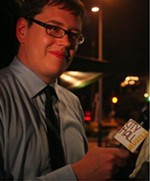City Hall Hustle: The Unopposed
Can we afford uncontested elections?
By Wells Dunbar, Fri., March 6, 2009
That situation befalls two City Council candidates this election. With only a few days left to declare – Monday, March 9, is the last day to apply for a place on the ballot – Place 2 incumbent Mike Martinez is unopposed in his re-election bid. And while it may not highlight an election's issues in the same way as a vigorously contested campaign, it's not uncommon for incumbents to run unopposed. (For instance, Place 6 incumbent Sheryl Cole faces nominal opposition from Sam Osemene.) Considerably less common, however, is an open seat drawing only one candidate – in this case, Place 5 candidate Bill Spelman.
Personally, Spelman says he's "very surprised." He offers a few speculative reasons for the lack of opposition: "People are tired of fighting," he says, believing that citizens are looking for candidates to make "judicious decisions." And Austin's business community, its attendant dollars and interest often powerful enough to build up or deflate candidacies, doesn't view him as a threat, either. "He's maybe not the best," Spelman says, is their train of thought, "but he's gonna be fair with us." Of course, more pragmatic considerations may also have played a part: Spelman announced early and is a former council member campaigning for the seat he once held – it's hard not to think of him as the quasi-incumbent.
There may be a larger advantage to running uncontested: As Michael May wrote for online City Hall newsletter In Fact Daily, because he's unopposed, "there is freedom" for Spelman to wade "into the tougher issues facing the city." The article cites, for instance, the candidate's willingness to re-examine union-negotiated contracts for the city's public service responders if the city budget worsens. Additionally, talking informally over coffee with Chronicle News staff, Spelman floated politically unpopular ideas such as paying for more city services with fees (for example, ultimately charging for repeated police visits to problem-fostering businesses) or – while wryly acknowledging its certainty never to be implemented – a local income tax as both more reliable and more equitable than highly volatile sales taxes. He even questioned the "boom-and-bust" rhythm of the high tech industries Austin has long coveted, calling for a diversified economy more resistant to the market's whims. This latitude in discussing and rethinking policy is a natural fit for Spelman, professor of public affairs at the University of Texas' LBJ School of Public Affairs.
But the question remains – is Spelman a stronger or lesser candidate for lacking a challenger? His campaign is premised on people-powered policy – all well and good, until you visit his website and realize the "issues" section outlining his vision for the city is missing. (He promised that content culled from his town-hall-style public meetings will arrive there shortly.) In summary, Spelman says, the focus of his campaign is affordability, increasing public participation, the economy, and the budget. He's just unveiled his first formal policy proposal: a "city/neighborhood matching fund" which pulls from at least two of his three issues. Modeled after a similar program in Seattle, the program would match labor and resources from neighborhoods with cash and/or services from the city on a one-to-one exchange basis. "You wanna plant some trees in your park?" Spelman says. "Well, we'll supply the trees; you supply the planting." Aside from the tangible benefits to emerge from such new projects, he also sees the program as helping to bring neighbors together, "getting people to talk to each other: What is the character of this neighborhood?"
Fittingly enough, the rise of neighborhoods' political power folds back on this column's question: why Spelman is unopposed and if we're better for that. Spelman himself provided a clue last year, when he decided to run for Place 5 instead of mayor, citing both the enormous cost and potential divisiveness of a mayoral run. As much as we'd like to pretend that Austin's form of government is workable as-is – everyone from Carole Keeton Strayhorn, who thinks the mayor and council members can get by with less staff, to Brewster McCracken, who opposes tinkering with the electoral machinery, to Lee Leffingwell, who never used the full force of his office in advocating for single-member districts – the city's sheer size and breadth now make an at-large run impossible for anyone other than the well-connected and well-financed.
With an intelligent, progressive candidate in Spelman, we'll be fine. Next time, we might not be so lucky.
Visit austinchronicle.com/hustle for more campaign news, including Hust FM, the Hustle's audio webcast.
Got something to say on the subject? Send a letter to the editor.










